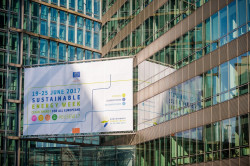Advancing knowledge in deep retrofit – Remo team attends Sustainable Places during EUSEW in June
This is what our colleagues, Miguel García Fuentes, (CARTIF), Ignacio González (Acciona Construcción), Jane Lumb (Nottingham City Council), and Alfonso Gordaliza (Veolia), tackled at this year’s edition of Sustainable Places hosted by Teesside University in the UK, drawing on their own tangible experience under Remourban. Organised by three FP7 projects, RESILIENT, PERFORMER, and ECODISTR-ICT, and backed by the European Commission, Sustainable Places focuses on energy-efficient buildings and smart grids. Our colleagues delivered a paper as part of a session on innovative district-level retrofitting scenarios which covered topics including model-based simulation and KPI-driven methodology for urban planning, the latter being presented by Miguel, but under the CITyFiED project. Jane Lumb who is head of Energy and Sustainability Policy at Nottingham City Council was invited as a keynote speaker and looked back at some of the city’s achievements towards greener urban living. As to be expected from the UK’s most energy self-sufficient city, the list was impressive: it has the largest district heat network in the country, the first local authority owned energy supply company and some of the lowest emissions per person for core cities. There are of course many challenges ahead such as old housing stock to remain for a long time to come; uncertainty over national policy, and the complexities of fuel poverty. And this is where Remourban comes in as the Lighthouse project, as it is aimed at regenerating existing cities into sustainable cities. In the light of advanced knowledge gained through the project, in particular in deep retrofitting, Nottingham City has now set its sights on retrofitting an extra 230 homes. Addressing the audience Jane said “We’ve already learnt a lot from the Remourban project and we’re keen to share and apply this advanced knowledge to other energy related projects across the city. This is leading to the installation of battery storage solutions in leisure centres, and community energy schemes being developed by the University of Nottingham.”
Keywords
efficiency, retrofitting, policy, buildings, smart cities
Countries
United Kingdom



